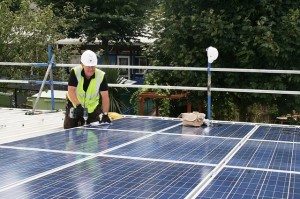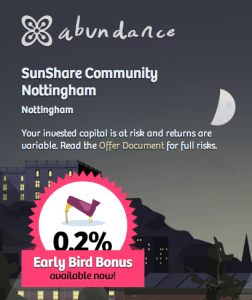 Launched in 2011 the mission is simple: connect communities and individuals with renewable energy projects while providing reasonable returns to investors. Abundance Generation is in the business of crowdfunding solar and wind projects where everyone benefits. Regulated by British Financial Conduct Authority (FCA), the company finances clean, renewable energy projects which for different communities. Individuals can participate in these projects by investing as little as £5. Abundance offers debt in these projects which are long term debentures. The company also powers a bulletin board where registered individuals may offer to purchase or sell these investments. Open to any UK resident who is 18 or older, you get an opportunity to reduce CO2 emissions, help grow renewable energy in the UK and generate a decent return on your invested capital.
Launched in 2011 the mission is simple: connect communities and individuals with renewable energy projects while providing reasonable returns to investors. Abundance Generation is in the business of crowdfunding solar and wind projects where everyone benefits. Regulated by British Financial Conduct Authority (FCA), the company finances clean, renewable energy projects which for different communities. Individuals can participate in these projects by investing as little as £5. Abundance offers debt in these projects which are long term debentures. The company also powers a bulletin board where registered individuals may offer to purchase or sell these investments. Open to any UK resident who is 18 or older, you get an opportunity to reduce CO2 emissions, help grow renewable energy in the UK and generate a decent return on your invested capital. Abundance Generation recently has been sited as one of the fasted growing crowdfunding platforms in the United Kingdom. One publication lists their Resilient Energy Great Dunkilns offer as the third largest crowdfunding offer to date in the UK – just after equity crowdfunding site Crowdcube.
Abundance Generation recently has been sited as one of the fasted growing crowdfunding platforms in the United Kingdom. One publication lists their Resilient Energy Great Dunkilns offer as the third largest crowdfunding offer to date in the UK – just after equity crowdfunding site Crowdcube.
Bruce: I worked for 15 years as an anthropologist studying the usage of money in the UK and around the world. I worked with egg, most of the major UK banks and then was part of the founding team of the first peer to peer lender – Zopa. I am a Visiting Research Fellow at Leeds University Bauman Institute and a Fellow of the Finance Innovation Lab.
Bruce: I was introduced to Karl Harder by a mutual friend who thought my experience of creating Zopa would be relevant to a project he was considering. We met for coffee in the British Library and within an hour had created the basic concept of Abundance as a new form of crowdfunding investment. We were joined by Louise Wilson who was previously Head of Capital Markets at UBS.
 CFI: Please share your thoughts on the current state of renewable energy in the UK prior to crowdfunding.
CFI: Please share your thoughts on the current state of renewable energy in the UK prior to crowdfunding.Bruce: Prior to Abundance, Renewable energy was the preserve of private equity funds and high net worth schemes such as Venture Capital Trusts. Banks were also retreating from the sector after the Credit Crunch so there was a perceived funding gap of between £60-100bn depending on estimates.
CFI: Your first project encountered a hurdle as the German Company PowerWind had financial difficulties. How did this impact Abundance?
Bruce: This caused a delay in our first project being constructed. There was no risk to our investors money and all money was returned while the delay was resolved. Subsequently when the project restarted a significant number of the original investors re-invested in the project which raised £1.4 m and is one of the biggest crowd funded projects in the UK to date.
We have carried out 5 subsequent raises for solar projects across the UK which have been a mix of construction and operational assets.
Bruce: We have upwards of 20 projects in our pipeline at any time with a range of developers. We do not select projects per se, but rather make them available for people to invest directly – each project is discrete and separate as an investment.
Bruce: All of our investors are individuals investing from £5 to upwards of £100,000. We have 800 investors to date who have together raised more than £3.5m across the six projects.
Bruce: The Bulletin Board has demonstrated satisfactory liquidity, with more than 23 trades completed for par or above par since it was opened in January 2013. Feedback on the process has been very positive from customers.
Bruce: We believe that this approach is fairer than using professionally brokered markets where information asymmetries tend to disadvantage the smaller investor. Also trading on our bulletin board is entirely free for both seller and purchaser which would not be the case on listed markets.
Bruce: We have 4000 registered users, with 800 investors to date. We also have a very high repeat investment rate with 10% of investors having invested in 5 or more projects and 50% of investors invested in 2 or more projects.
Bruce: Press coverage of our projects is an important recruiter of new investors, as is word of mouth. We also engage in specific marketing campaigns with specialist financial and green orientated media websites and magazines.
Bruce: There is potential, as a regulated company and product, to export the Abundance platform across the EU.
Bruce: Overall we have had strong support from individual ministers although we are actively campaigning for a level playing field on tax with traditional financial institutions which also benefit from the implicit subsidy of being ‘too big to fail and too big to jail!’
Bruce: Every project funded by Abundance investors is another independent energy company generating clean renewable energy for the national grid and as such provides real competition to the Big 6 and their addiction to fossil fuels. The evidence from Germany is that lots of energy producers make for less profitable and less dominant energy companies as a whole!



